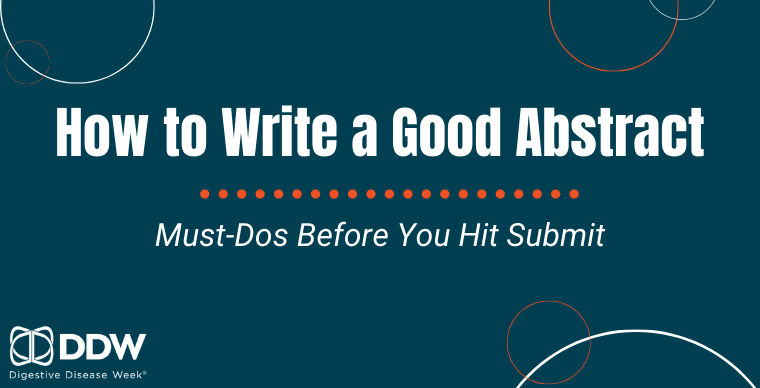
Whether it is a passion for esophageal dysmotility or an interest in inflammatory bowel disease (IBD), we know academic gastroenterologists (and gastroenterology trainees) nurture their love for research by investigating things unknown. Much time is spent constructing a robust research question and crafting the perfect methodology to answer it. Once data analysis is done, and conclusions have been reached, the abstract is ready to be written. But what are things to keep in mind before you submit your abstract to Digestive Disease Week® (DDW) 2021? Here’s what you should do before the submission site closes on Dec. 3, 2020, at 21:00 Eastern time (UTC –5).
1. Formatting
DDW has specific formatting instructions in the abstract submission guidelines, including title and word length. Even if you’ve submitted to DDW in past years, it’s important to review the guidelines for 2021 for any changes. You do not want to delay potential abstract acceptance because of formatting mishaps. Triple check that your abstract abides by all the rules.
2. Visuals
Figures, tables and images can bring your words to life, by showing a trend of a given disease, a rare histologic diagnosis, or an informative cutaneous manifestation of a systemic illness. Results from studies large and small can be summarized in one figure more succinctly than paragraphs are able to and can be a good way to cut down on the words in your abstract. The submission guidelines have specific formatting guidelines for images and tables. Overall, your images should be:
- High quality (at minimum 600 dpi resolution)
- Labeled specifically (“Figure 1”)
- Simple (avoiding extraneous lines, marks, or borders)
3. Flow
At its core, your abstract is a chance to showcase your research to a reviewer in a concise and digestible manner. You want to write your abstract ideally as a story — with a beginning, middle and end. It should be a narrative that gently, but inevitably, leads the reader to your conclusion. This would be difficult normally but living within the confines of word limits poses additional challenges. Read your abstract as if you are not well acquainted with the topic and think about questions that a reviewer might have that you could anticipate. Read your abstract with that specific lens — not just for scientific accuracy or statistical integrity, but also for how it flows.
4. Audience
Know who your audience is. Peruse past abstracts to see what DDW has accepted in the past, and assess if you would fit in well within their ethos. You can review the abstracts accepted for DDW 2020 in the DDW ePosters archive or in online supplements to Gastroenterology and GIE: Gastrointestinal Endoscopy.
5. Review
Undoubtedly your abstract will be read by multiple individuals during the editing process prior to submission. Make sure to allow ample time for each author to read, review and comment on any changes that need to be made. Pay close attention to typographical or grammatical errors that may be missed by eyes that have read the words hundreds of times. It may be helpful to have someone separate from your research team review the abstract for formatting and syntax. And as always, review the instructions one last time before hitting that “Submit” button.



